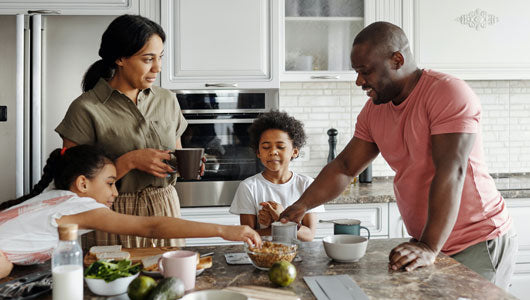
Parenting Partners
Some call it co-parenting, others call it a parenting partnership. Either way, it all comes down to the joint effort to raise children together, regardless of your relationship status. Follow along as I detail what it means to be parenting partners, and the many different ways a parenting partnership can be successful.
What Is A Parenting Partner?
Let's start by defining what it means to be a parenting partner. Simply put, a parenting partner is someone who works with another person, usually the guardian of the child/children they have in common, to provide the best environment in which to raise their kids. Another term for this kind of relationship is co-parenting.
In co-parenting relationships, it is common for the people involved to have shared a romantic relationship in the past, but no longer do. That said, the main idea behind a parenting partnership is that a failed romantic relationship should not stand in the way of successful parenting. For example, two people going through a divorce might make the decision to establish the terms of a co-parenting relationship as they navigate their changing family dynamic.
While it's common for co-parents to have shared a romantic relationship at some stage, it's not always the case. In many co-parenting situations, the guardians are relatives. For example, a brother and sister might work together to co-parent a younger sibling or cousin. Or in another scenario, a child's mother might work with her own mother in a parenting partnership.
The specific nature of the relationship between co-parents can vary, but the thing all co-parents have in common is the shared desire to raise their dependents together.
Of course, co-parenting can be tricky, just like any relationship. So let's talk a bit more about how parenting partnerships work.
How Does Co-Parenting Work?
No two co-parenting styles are exactly the same. That's why it's so important to communicate with your parenting partner in an honest and effective way in order to reach the best possible parenting strategy. Remember that there is no perfect parenting partnership, and each one is unique.
Here are a few common co-parenting strategies:
- Split Custody. Co-parents often have a split custody arrangement in which time spent with the child/children is shared. In these situations, the co-parents don't typically spend any time with each other, but do communicate regularly to ensure consistent parenting methods.
- Shared home. Sometimes co-parents decide to remain living in the same home despite the end of their romantic relationship. Or, they never had a romantic relationship, but find that sharing a home is the most effective way to co-parent. Either way, co-parents who live in the same home are still expected to regularly communicate in order to keep all methods of parenting consistent across the board.
- Calendar-keeping. Regardless of your living arrangement, keeping a shared calendar is a great way for co-parents to keep track of their children's schedules, diets, discipline/rewards, and more. Again, one of the most important things in co-parenting in consistency, which can be maintained more easily with calendar-keeping!
- Family counseling. One of the most instrumental things in keeping a healthy co-parenting partnership is family counseling. Whether you include the kids or keep it between you and your co-parent, therapy can be a fantastic way of keeping the dynamic effective, healthy, and communicative.
Is Co-Parenting a Relationship?
There can be some ambiguity surrounding the concept of what is and what isn't a relationship. However, the dynamic between parenting partners is absolutely a relationship. Some people assume that a relationship implies romance or sex, but that's not always the case. Friends, relatives, neighbors, mentors, and co-parents are all different and important relationships.
My advice? Don't get tripped up on the word relationship. The terms of your parenting partnership are totally up to you and your co-parent. So try to focus on the tasks on hand rather than getting hung up on whether or not your co-parenting dynamic should be considered a "proper" relationship.
At the end of the day, the health and wellbeing of you, your co-parent, and the dependents you care for is priority one.
